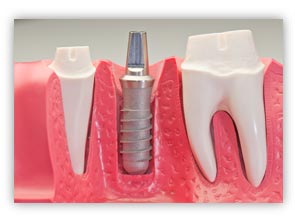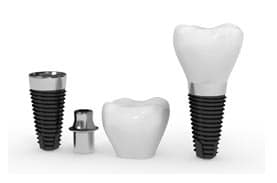A dental implant is a form of cosmetic dentistry used to replace missing teeth for a look and feel that is natural.
They are surgically placed below the gums over a series of appointments.
The procedure involves attaching the implants to the jawbone and gum tissue to become a stable base for one or more custom artificial replacement teeth, called dental crowns.
Candidates for dental implants need to have healthy gums and adequate bone to support a secure implant. Consult with your dentist to see if you are eligible for dental implants.
Dental implants are frequently the best treatment option for replacing missing teeth because unlike dentures that rest on the gumline or the use of adjacent teeth as anchors, dental implants are long-term replacements that your cosmetic dentist or oral and maxillofacial surgeon surgically places in the jawbone.
Tooth Loss
Tooth loss can be an embarrassing condition that most adults ages 20 and older have had to deal with. Most people in this age bracket have lost at least one permanent tooth to an accident, gum disease, a failed root canal, tooth decay, excessive wear, and tear, or congenital defects.
Regardless of the reasons related to tooth loss, dental implants may provide a smile remedy with proven results.

Who Is a Candidate for Dental Implants?
With the exception of growing children, there may be a dental implant solution for you.
Whether you need to replace one tooth, several teeth, or all your teeth, dental implants may be the solution for people of all ages.
The following is a list of health conditions that can benefit from implants:
Existing Medical Conditions- If you currently have routine dental treatment, you can generally have an implant placed. Your doctor will let you know if you have a certain condition in which an implant would not be appropriate.
Patients with chronic diseases such as high blood pressure and diabetes are usually successful candidates for dental implant treatment.
Gum Disease- Patients who have lost their teeth to periodontal (gum) disease have been successful recipients of dental implants.
Currently Wearing Dentures- Patients who wear dentures or removable bridges are eligible to have them replaced with dental implants. The implants can also be used to stabilize and secure dentures, making them much more comfortable.
Smokers- Smoking may lessen the success rate of implants although smokers have also been successful recipients of implants.
Bone Loss- Bone loss is a common occurrence for people who have lost teeth or had periodontal disease. Cosmetic dentists are trained and experienced in grafting bone to safely and permanently secure implants.
Dental Implant Procedure
New advancements in technology have given choices for the types of implant procedures that are offered. There is the traditional implant and the mini dental implant. The differences are explained below.
The beauty of dental implants is that they are virtually indistinguishable from other teeth. The science behind this lies in the connection between the dental implant and the living bone.
Implants can be placed in one sitting but require a period of osseointegration. Osseointegration is the process in which the bone fuses with the implant.
In the first step, the dentist surgically places the implant in the jaw, then a healing process of anywhere from three to six months takes place for it to anchor and heal.
Once the implant has anchored with the jawbone the dentist can then attach an extension, but first must uncover the implant under the healed gum tissue.
After this has been completed the extension, called a post, is attached to the implant. In some cases, the post may be attached during the initial procedure.
When the post is in place, your dentist then will make a crown, which has a size, shape, color and fit that will blend with your other teeth. When the crown is completed it is attached to the implant post.
Mini dental implants are recommended for patients who already have dentures but experience difficulty with their loose fit. This procedure involves a short process that locks the loose dentures into place.
Because of the small size of the implants (they are about the diameter of a toothpick) more people can qualify for the option. After the mini dental implants are installed, the top of the implant which is shaped like a ball snaps into the metal housing of dentures.
The dentures can be removed for cleaning, and are easily attached for a tight fit.
Mini Dental Implants have these fundamental differences to traditional:
- They are about half the width of traditional implants
- They are not fully submerged during a narrow implant procedure
- If the implant procedure fails, grafting is not necessary
- They are less costly
- They are solid though they do not contain a screw
- Mini dental implants are primarily used to secure removable teeth. They cannot have a crown placed on them

Dental Implant Recovery
The recovery time associated with dental implants varies on the complexity of the procedure.
Generally healing from the surgical procedure to place the dental implants takes up to six months, while the fitting and seating of the crown(s) can take up to two months.
Follow-up appointments with your dentist will reveal the healing times of individual cases and treatments. Most people can expect mild soreness, bleeding, or swelling which can be treated with first aid and over the counter medicines. Generally, patients can expect to function normally within a day or two.
Once an implant has been placed, however, maintaining diligent oral hygiene habits is required to ensure proper fusing of the implant and bone structure.
Failure to routinely brush and floss is a leading cause of implant failure, and infection can occur if the implant and surrounding areas are not cleaned properly.
Smoking is also frowned upon as it is attributed to high failure rates with dental implants and should be avoided following implant procedures.
Dental Implants Cost
Dental implants can get very expensive depending on the type of implementation, the dentist performing the procedure, insurance, and the number of teeth involved in the procedure.
Each surgical step incurs its own costs, as do the fixtures. Single implants typically range anywhere from the $1,000 to $5,000. Full sets of dental implants can range from $25,000 to $100,000.
Success Rates
Dental implants are amongst some of the most successful procedures in dentistry. It is important to choose an experienced cosmetic dentist or oral and maxillofacial surgeon to perform the procedure.
Success rates are lower for smokers because they face a higher risk of implant failure. Smokers will likely be asked by their dentist to give up smoking before the procedure to avoid the risk of failed osseointegration.
On the plus side, dental implants that are properly maintained can last upwards of 40 years.


